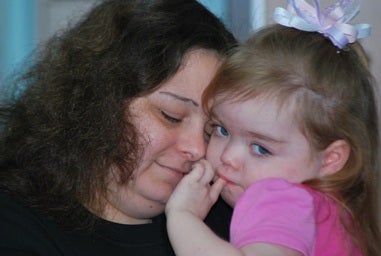Hypoplastic Left Heart Syndrome
Mackenzie Diveley was born with a badly broken heart. Her mother knew it was going to happen. A sonogram taken when Jessica Diveley was five months pregnant showed that Mackenzie’s heart was forming improperly. The condition is called hypoplastic left heart syndrome, something Jessica and her husband, Heath, knew little or nothing about until doctors in Decatur described it with drawings and a tone of serious concern. The syndrome occurs when the left side of the heart fails to develop completely. Essentially, this leaves the heart unable to pump enough blood to nourish a child’s body. If untreated, the condition eventually causes the right side of the heart to fail, too. There are a host of medical interventions—surgery and drugs—that can save these children, but it takes early action and a Herculean effort by families and physicians. Mackenzie, now 3 years old, has survived, but only after a harrowing health Odyssey and the most advanced care that medical science has to offer. Mackenzie was one of the first patients at Children’s of Alabama’s Bruno Pediatric Heart Center, which opened last year. Long before Mackenzie was born, the Diveleys were referred to the University of Alabama at Birmingham, where specialists are trained to handle high-risk pregnancies and births. Mackenzie was born at UAB on Sept. 7, 2009, Labor Day. Immediately, Mackenzie was whisked away for intensive care. Her first surgery was performed when she was 10 days old, and her second surgery when she was 16 days old. The Diveleys were finally able to take Mackenzie home when she was 12 weeks old. That was the day before Thanksgiving 2009, and Mackenzie had a feeding tube and required oxygen. “It was very scary,” Jessica recalled. At first, Mackenzie seemed to be holding her own, but feeding her by mouth was problematic and she was weak. In February 2010, Mackenzie required another operation at UAB, and then began seeing doctors at Children’s Hospital. For awhile, Mackenzie seemed almost normal. She started walking, running and playing, her mother said. “Then, all of a sudden she just lied in bed and didn’t want to do anything.” In May 2012, doctors performed another operation on Mackenzie in an attempt to get her heart to work more efficiently. Mackenzie returned home, but by mid-summer, she became extremely ill again and was unable to keep food down. She went back into the hospital. At first, doctors suspected digestive problems, but they eventually determined that her heart was failing. They performed another heart operation—threading a catheter through blood vessels in an attempt to repair damage—and then realized that the only thing that could save Mackenzie would be a heart transplant. “I was scared and shocked,’’ Jessica said. “I don’t think I ever stopped crying.” After entering the hospital on July 13, 2012, Mackenzie began a six-month wait for a new heart. Pressure on the family was enormous. Mackenzie was weakening, and needed a family member nearby constantly. There were two other Diveley children at home who needed attention, too, and a father who needed to work. Mackenzie’s maternal grandmother, Tina Robinson, stepped in to maintain a constant watch over Mackenzie in the hospital, sleeping in her room, and getting up with her throughout the night. The Diveleys drove back and forth from Falkville, while the Ronald McDonald House in Birmingham provided critically needed accommodations for the family. It was a nerve-wracking and exhausting ordeal. In addition to everything else, Jessica became ill and developed pneumonia. Meanwhile, conversations started about the possibility of Mackenzie having to go on life support. “We were on the last two choices: Getting her a heart or putting her on life support,’’ Jessica said. Seven times doctors told the Mackenzie family that a heart might be coming available, but each time, complications with the donor organ made the transplant impossible. “Once, she got all the way to the operating room doors,’’ Mackenzie’s grandmother said. Finally, the eighth heart was deemed acceptable, and on Feb. 3, 2013, Mackenzie received the transplant. The operation was performed at UAB, but in March, doctors at Children’s began performing pediatric heart transplants, as part of the hospital’s initiative to provide world-class cardiac care. Jessica’s new heart is working. “She looks very good,’’ Jessica said. “She’s starting to get energy back.” There are many challenges ahead for the Diveleys. The family must spend about six weeks with Mackenzie at the Ronald McDonald House to ensure that medical help is close by in an emergency. Moreover, it is likely that Mackenzie will have to take special drugs the rest of her life to keep her body from rejecting the transplanted heart. Still, for the time being, Mackenzie has been given a second chance for life, and the family is hopeful. Mrs. Diveley said the experience opened her eyes to the complicated health problems experienced by many children. A family in the room next to Diveleys was from another state. “They are waiting for a heart, too,” Jessica said. It has been most helpful—and comforting—to interact with other families of sick children, she said. It’s good to know you are not alone while going through a difficult experience, but these relationships are also tough. “You get attached to these people,’’ she said. “We had one who went home and passed away. He was my little buddy.” Doctors and nurses have been caring and helpful, but it still has been a difficult experience. “It’s one of the hardest things you will ever have to do is watch your baby slowly go,” she said.







